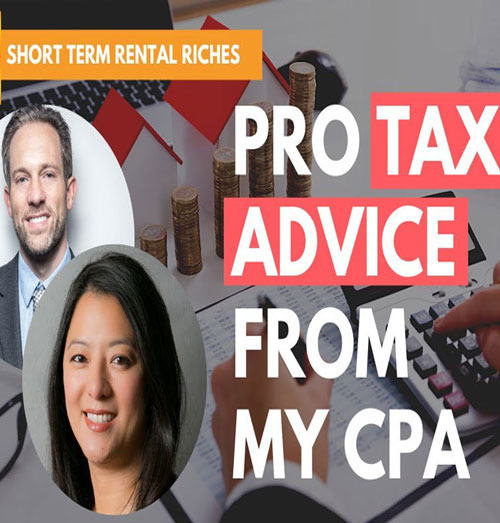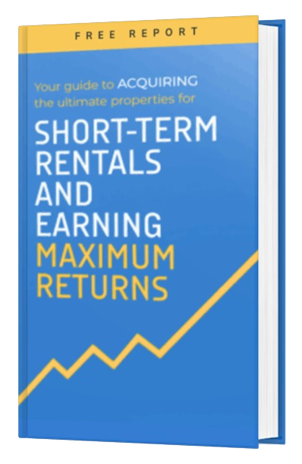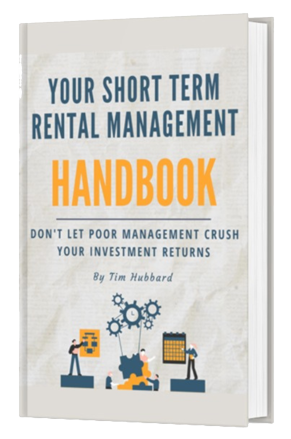How to build an Airbnb business: Lower Your Taxes by Operating Airbnbs
One of the two biggest expenses that everyone incurs are taxes. Which means, legally lowering our taxes should be of the utmost importance! For easy numbers and simplicity’s sake, if you have $1000 in income taxes and you neglect to write off an immediately deductible $500 expense you incurred operating your short-term rentals then you just unnecessarily GAVE your government $500!
For many people taxes are intimidating. You may be asking, “Can I write this off? “I don’t want to get audited.” But I’m here to tell you, as long as you follow the rules you should NOT be concerned. My tax advisor specializes in real estate and they recently put together a great webinar dedicated to tax advice and your STR’s… and since I know we are all busy and taxes aren’t necessarily the most fun topic, so I took the liberty of breaking down the webinar FOR YOU with my biggest takeaways that you need to know!
This week we’ll talk taxes and break down:
- How the IRS defines a short term rental
- Different types of income reporting (Schedule E vs C)
- How your tax losses are treated?
- What it means to be a “real estate professional” and how that can benefit you
- How you can become a Real estate professional EASIER with STR’s than you can with traditional long term rentals
- Depreciation
- How much you can use your property for “personal use”
HUGE DISCLAIMER: I am not a tax professional and these are just recommendations of topics to look into so please check with your tax advisor and accountant to confirm they will work for you.
You can also find the whole, hour long video webinar by vising https://restmethods.com/recommended-resources/ and finding “Keystone CPA.
Want a crash course in just two days with everything you need to know to find, acquire and operate a short-term rental with passive operations? Good news! We have our latest live webinar recording available!
Are you enjoying the podcast? Please subscribe, leave a rating and a review, and share it! This helps us reach others that may find the info helpful as well.
You can find all of our links here including our website, webinar, Instagram and more!
Click Here to view TranscriptIn the short-term rental riches will discuss investing in real estate with a specific focus on short term rentals quick actionable items to wire. Scale your portfolio I’m your host Tim Hubbard.
Welcome back to short-term rental riches podcast I’m happy you guys are here I’ve got a portent topic again this week it has to do with taxes I know that’s not the most exciting topic in fact it’s maybe my least favorite topic but it’s super super important why because what are the 2 biggest expenses that most Americans paying for most people in the world that would be their housing costs how much it cost for them to live or rent and their taxes so if we can eliminate as much of our taxes possible of course legally then the better off we’re going to be and there is a great weapon are that my CPA recently just put on specifically for short term rentals so I want to break that down for you there’s some things I think you might not be aware of and if you listen to podcasts for while you know we had an episode where I interviewed them awhile back and that was fantastic too but this week I just want to break down some of these things in a nutshell so that you can look into them if you weren’t aware of them before and as a disclaimer of course I am not a tax professional so make sure that you check with your accountant before you try to implement any of these options first of all what is a short term rental in the eyes of the IRS well in the eyes of the IRS a short terminal is any rental that has an average stay less than 7 nights that’s going to be simply the number of days rented in the year devided by the customers that bought a so that’ll give you the starting point to know whether your rental she. Be treated or can be treated as a short term rental so number 2 is the distinction between reporting a schedule II which is gonna be like our normal real estate rentals on our tax return or schedule C. which is gonna be more like sole proprietor ordinary income on our tax return so the difference because a lot of people think in operating short term rentals that it’s taxed as a business but not necessarily in fact most the time it’s not as long as you are not offering hotel like services so you’re not picking people up from the airport you’re not doing daily housekeeping you’re not offering you know food services and things like that so that is a big distinction that you want to look into if you’re already offering those well then you may be taxed differently if you were to get audited so just keep that in mind and what is the big benefit to being taxes schedule Iverson schedule see or if your taxes schedule II it doesn’t require that you pay additional self employment taxes so you know that could save you up to 15 percent on self employment tax if you’re currently filing a schedule C. so check that one again check all of these with your CPA just to double check but that can be a really big one right there a really awesome thing in the world the real stay when it comes to taxes is that if we’re doing enough real state would become what they call a real state professional and that allows us to write off our losses against other ordinary income that we didn’t get from real estate so that’s a huge one right if your W. 2 earner eye doctor sole proprietor anything like that you have other income coming in but you have losses from your real estate well if you’re real estate professional you can use those losses to offset the income tax that you pay from your other work so this is huge in. And historically it’s been pretty hard to achieve this real estate this professional real estate status so if we’re talking about traditional long term rentals in order to qualify as a real estate professional traditionally you need to spend more than 750 hours a year and you can’t spend any more time than that I do in some other type of work so that’s one way you could qualify as a real estate professional no one of the great things about short term rentals is that we can qualify as a real estate professional a little easier than that so I want to give a couple of the options that my CPA mention in her recent weapon are that might make us eligible as a real estate professional operating short term rentals and not long term rentals so there’s a couple different ways the first wife you spend at least 500 hours a year with your short term rental so that could be you know dealing with gas dealing with housekeeping setting up your online software systems you name it if it has to do with your short term rental and you’ve acquired or you’re working more than 500 hours a year and and you can document it well then you may qualify as a real stay professional no matter if you spend more than 500 hours a year working in your other profession. I am the cool thing about this is you can actually group the hours that you spent on multiple properties together let’s say you have 5 short term models and you spent about 100 hours on each 1 of them will cumulatively you have 500 hours you might be eligible as a real estate professional which means you could use some losses from your real estate income to offset your other income this can be huge because as we know real estate has a great tax benefits if were taken advantage of them like bonus depreciation that’s a whole podcasts on its own I probably mention it in past ones but that’s a big 1 that’s a big 1 method to second way you might qualify as a real estate professional if you’re operating short term rentals and that’s if you spend 100 hours on your short term rental but but this is the big 1 no 1 else on your team and your business spends more than 100 hours on your short terminal so if you have a housekeeper and she’s doing all the work and she spends 100 and 10:00 hours a year and you only spend 100 well then you wouldn’t qualify by this method that could be an option so there’s 2 good options you might not have known about it may make you eligible on your taxes the files a real state professional and now if you’re doing a lease arbitrage out there the same rules still apply so consider that and why is this important because if we have losses like from depreciation and we’re not a real estate professional it’s they were paying 3540 percent income tax well then we can offset that with let’s say that we pay $100000 a year in income tax and we have a property where we can run some bonus depreciation on our work depreciation again for those at all now that’s basically a ghost expense it’s a expense that we get to deduct against our income on our tax returns that doesn’t actually cost us money so. A typical property for example can be depreciated over 27 a half years that’s taking the physical property not the land dividing the estimated value by 27.5 years and each year you get to deduct that off your taxable income now if you’re not a real estate professional then you can’t deduct that off your income but let’s say you can and that depreciation happened be $40000 of a loss and you are paying $100000 in income tax well then you just put $40000 back in your pocket right this can be really really big something you definitely want to spend time on and not just at the end of the year it’s an all year thing you wanna make sure you’re planning for this ride short term rentals are actually depreciated a little differently than a traditional long terminal they’re going to be over 39 year period but we do have this option for bonus depreciation and that’s where we can do an accelerated depreciation I apologize if this is getting a little complicated hopefully for most of you it’s it’s kind of a consensus for those of you where it’s still a little blurry just know if you don’t know a lot about it you need to dig a little deeper into this and talk with your CPA but basically bonus depreciation can allow us to accelerate a lot the depreciation so we can take a big loss to offset our income earlier on so that’s a really really big one now course for their short term rentals we have lots of expenses and lots of other things that we can deduct offer taxable income you know we buy furniture that’s in tax expense we have utility costs so all of those normal operation consequence we can expenses like we could with the traditional rental and then also one other little tidbit one little good tip in here is that you know for making income off VR BO and Airbnb a lot of times what hits our bank account is not the actual gross amount of income. That we earned let’s say we made $100000 but Airbnb charged are 3 percent fee or VR BO at a higher one let’s say $10000 of that original 0 was a booking expense from one of the online travel agencies well we want to make sure recording the whole amount the gross amount on and why well it’s still going to come out the same way on our on our taxes but when it comes to lending a lot of lenders will will approve you for a loan based off your gross income to want to make sure that that’s going to be as high as possible and the last topic that comes up here for taxes something you might want to consider this give me more for those of you that have vacation properties or properties where you like to actually spend time with to be careful how much time we spend in the property that’s not related to business because the time that’s not related to business we can’t deduct that so let’s say 50 percent of the year you live in your short term and all the other 50 percent of the year you run it as a short term rental investment as a business well then you can deduct 50 percent of those expenses now if you use it less than 14 days a year your deductions will not be limited it depends on how much time you’re spending now if you’re staying in your property for a week for example but you’re there to fix up the property here there to put furniture in there well then that’s still business related so that’s not going to count as personal use so these are just some some tidbits around that the tax strategies and things we want to be considering a short terminal operators the huge huge huge one is do you qualify as a real estate professional and you might be able to deduct some expenses off your other income or your ordinary income so check with your tax advisor check with your CPA make sure you’re documenting all of your work and stuff as well to of course if you get audited you’re going to have to prove a. All of these things so do a good review and please please don’t wait till the end of the year to do your taxes it’s something you should be thinking about all time a quarterly review strategize it will pay off believe me because think about it we have $1000 of taxes and we have an extra expense of $400 that we forget to write off well then we just lost $400 you know so we want to take all these tax deductions legally of course but want to use as many of them as possible so I almost forgot if you want to watch this weapon are your self right directly for my CPA will then make sure you had or website rests methods.com check out the recommended resources section and you can see the whole hour long weapon aren’t there and hear from professionals themselves so make sure to check that out until next time have a wonderful day out there have a great day we’ll see you back next week. There’s so much money to be made the short term rentals but it all starts by having the right property if you guys haven’t yet seen my free ebook on our website rest methods.com head over there and get a copy it’s going to break down what I look for in a property in some great short cuts so that you don’t have to spend hours and hours researching at over rest methods.com and you can grab your free copy there if you want a crash course in everything I’ve really learned to short term rentals in over 5 years managing over 15000 Gasol recorded on our last live event I am happy to say we broke it down really nicely into a bunch of different modules that you can watch at your own pace it takes you from start to finish from finding a property we talk about analyzing the property but then also some of the more important pieces how to find your team and how to set up everything so that you can run your operation is passively as possible and free up your time you can find that it rests methods.com forward slash virtual.
RELATED PODCAST EPISODES
- Episode 68: Operating Our Rentals Remotely – The Secret Ingredient
- Episode 62: Professional Tax Advice From My CPA – Part 2
- Episode 21: Money coming your way! (And Industry Updates)
- Episode 15: Have You Incorporated These in Your Rentals?
- Episode 08: How to Price Your Short-Term Rental Perfectly – EVERYDAY!




















This is a great recap for me post-conference!